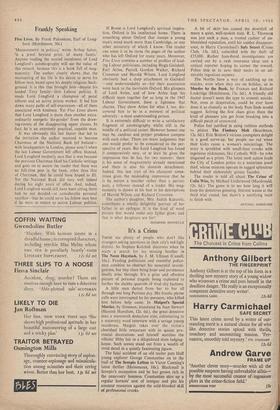Frankly Speaking
'MAGNANIMITY in politics,' wrote Arthur Salter, is a jewel beyond price, of many facets.' Anyone reading the second instalment of Lord Longford's autobiography will see the value of this remark, because this is a book full of mag- nanimity. The author clearly shows that the mainspring of his life is his desire to serve his fellow men, based upon his deeply religious back- ground. It is this that brought him—despite, his landed Tory family—into Labour politics. It made Lord Longford a champion of penal reform and an active prison worker. It led him down many paths of self-expression—all of them associated with kindness. Yet Five Lives shows that Lord Longford is more than another extra- ordinarily energetic 'do-gooder' from the draw- ing-rooms of the disappearing upper classes. In fact, he is an extremely practical, capable man.
It was obviously this last factor that led to the invitation the author received to become Chairman of the National Bank (of Ireland— with headquarters in London, please note!) when the last Labour Government left office. Instead, Lord Longford modestly says that it was because the previous Chairman liked his Catholic writings and goes on to assure the reader that there was no full-time post in the bank, other than that of Chairman, that he could have hoped to fill. Yet the National Bank did very well indeed during his eight years of office. And, indeed, Lord Longford would still have been sitting there had he not decided—at considerable personal sacrifice—that he could serve his fellow men best if he were to return to active Labour politics. If Rome is Lord Longford's spiritual inspira- tion, Oxford is his intellectual home. There is something about Oxford that stamps a young man's mind much more than Cambridge, or any other university of which I know. The reader can sense it as he turns the pages of the author who has left Oxford for many years. Moreover, Five Lives contains a number of profiles of lead- ing Labour politicians, including Hugh Gaitskell, Earl Attlee, Patrick Gordon Walker, Richard Crossman and Harold Wilson. Lord Longford obviously had a deep attachment to Gaitskell —and understandably so—for their association went back to the inevitable Oxford. His glimpses of Lord Attlee, and of how Attlee kept his difficult team together for so long in the 1945 Labour Government, have a lightness that charms. They show Attlee for what I, too, dis- covered him to be in a moment of political adversity: a most understanding person.
It is extremely difficult to write a satisfactory fragment of autobiography whilst still in the middle of a political career. However honest one may be, candour and proper prudence compete with each other. There are many judgments that one would prefer to be considered in the per- spective of years. But .Lord Longford has found it comparatively easy, or at least he gives the impression that he has, for two reasons: there is his sense of magnanimity already mentioned and there is also his donnish detachment. Indeed, this last trait of his character some- times gives the misleading impression that he is by nature a watcher rather than a partici- pant, a follower instead of a leader. His mag- nanimity is shown at his best in his descriptions of Harold Wilson and Richard Crossman.
The author's daughter, Mrs. Judith Kazantis, contributes a wholly delightful portrait of her father in an epilogue. It is the kind of word picture that would make any father glow; and that is what daughters are for!
DESMOND DONNELLY






































 Previous page
Previous page